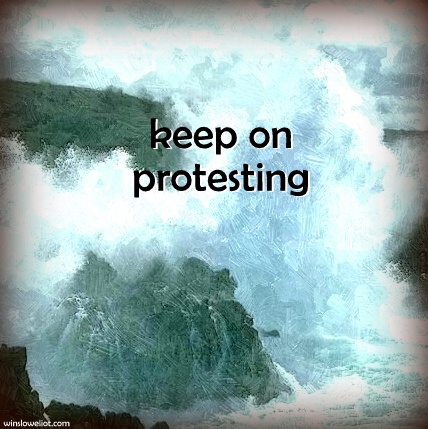
Stillness 6-4: Whether we protest on a global scale or a domestic one, protest is a vital practice to our inner development. When we are infringed upon in ways that are harmful, we must stand up for ourselves. It can be very difficult–one of the most difficult things in the world for some! And we have to learn about the “when” and the “how” of protest. For example, sometimes I have to help a client stand up against abuse that most of us could not imagine putting up with. Other times, someone needs to realize that their partner has equal validity in their demands. It’s always an interesting dichotomy that constantly plays out in human relationships. Where do “I” stand in relation to “you”? How much do I give and how much do I receive? Who has more power? Am I the weaker or the stronger? Sometimes it amazes me that anyone gets along together!
But when we understand the value of protest, we actually get along much better. When we protest anything, we’re declaring our feelings out loud. We are testifying to something that matters so much to us that we wish to state it publicly. The word originates from pro which means “forth or before or in front of” and testari which means to witness or to testify. Its current meaning as “a statement of dissent from, or rejection of, prevailing mores” is from 1953 and emerged directly out of the civil rights movement in the United States. The first recorded march that was literally called a “protest march” is from 1959.
I was thinking today how much and how little has changed from sixty years ago. Much more has changed, though, than hasn’t. The terrible events, significant progress, increased awareness, and then more terrible events that continue to pummel society are like waves crashing against cliffs. Each wave is changed, shattered, turned to spray and moisture, and then retreats. Each rock is battered, stands fiercely, and eventually gets worn away to sand. Everything changes, evolves, and becomes something else. It’s up to each one of us to create the changes we want, changes that allow us to become who we are, in freedom, dignity, safety, understanding, and justice.
This is true in society, in personal relationships, and it all starts with feeling this within ourselves, for ourselves.
On a global level, whether we protest through marching, donating, connecting, inwardly supporting, stating truthfully, or simply witnessing the clamor of the world that demands equality, safety, and embrace, there are times, like now, when we must protest. We simply must.
